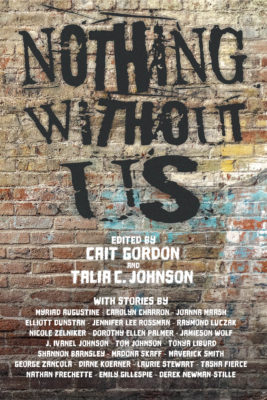The manifesto of plucky editors Cait Gordon and Talia C. Johnson for this anthology was to gather great short stories that not only centre the disabled experience (all main characters are disabled, Deaf, neurodiverse, spoonie, and/or managing mental illness or chronic conditions), but also buck the tired tropes that dominate disabled representation. As Derek Newman-Stille writes in the foreword, many of us long for characters that mirror our bodies and lives but that are not freak- fetishized, inspiration porn, “poorly devised plot devices” or “signs of social collapse.” This collection features twenty-two short stories with disabled protagonists, by twenty-two writers with diverse identities intersecting multiple marginalized communities, traversing just as many styles, genres, and voices. What might give an inkling of the overall feel is a little excerpt from the editors’ defiantly lit-nerd epic-poem-style call for submissions:
Bring us your Deaf heroes, your disabled, your neurodiverse,
your characters breaking free from the shackles of normativity,
those who are not refuse, but fabulous.
Send these your homeless stories, tempest-tossed to us.
A month after I read the collection, the story elements that still linger with me describe certain social and physical experiences of Othering, and aspects of defiant identity formation, that will resonate with many, disabled or not.

Nothing Without Us
Edited by Cait Gordon and Talia C. Johnson
Renaissance Press
$25.00
paper
280pp
9781987963663
The narrator in Raymond Luczak’s “Mafia Butterfly” describes her social ostracism by a powerful Deaf community leader who snubs those who, like her, aren’t fluent in Sign or from a Deaf family. As she comes out of her “cocoon,” learning Sign and accessing “capital-D” Deaf culture, she starts to hear what her teacher is saying: “Himself same-same m-a-f-i- a decide maybe you nothing. If happens, worry not. Himself run Deaf community not.
In Jennifer Lee Rossman’s “Names,” a shaman “who went bad in the sun” and turned into a witch threatens a community and is fought back by strange girl Beck Benally, armed only with the stories of her Navajo granny. “All my life, people have tried to make me say names, make me look them in the eye and touch them without flinching.”
In “Knit One, Purl Two,” by Carolyn Charron, the spirited, elderly, arthritic Maggie takes her devilish basement tenant as a lover before realizing, when he flinches at a wooden knitting needle, that his coffin coffee table is more than a conversation piece.
While the range of identities expressed by the writers and their characters is plenty refreshing (e.g., non-binary, Black, Deaf, Indigenous, neurodiverse, Jewish, spoonie, American, Canadian… vampire) it is hard to reflect the sheer diversity of the writing itself – some is mature and nuanced, some is young and green. Expect some pat, corny endings and simplistic plots alongside stimulating, sharp commentaries on the disabled experience. mRb






0 Comments